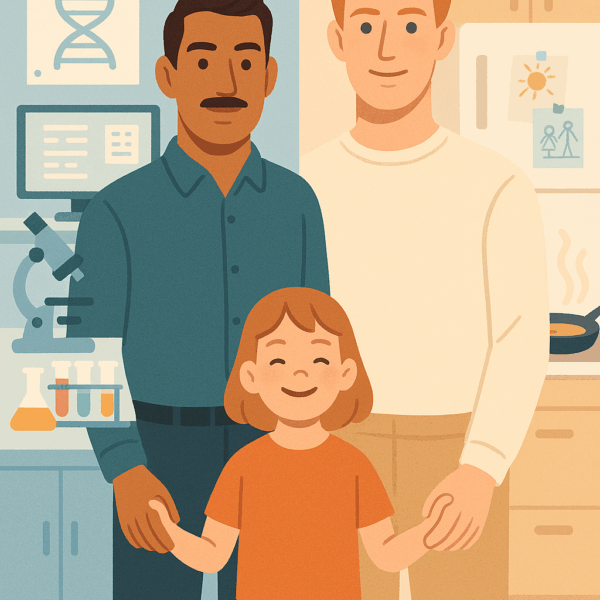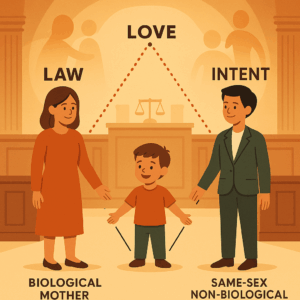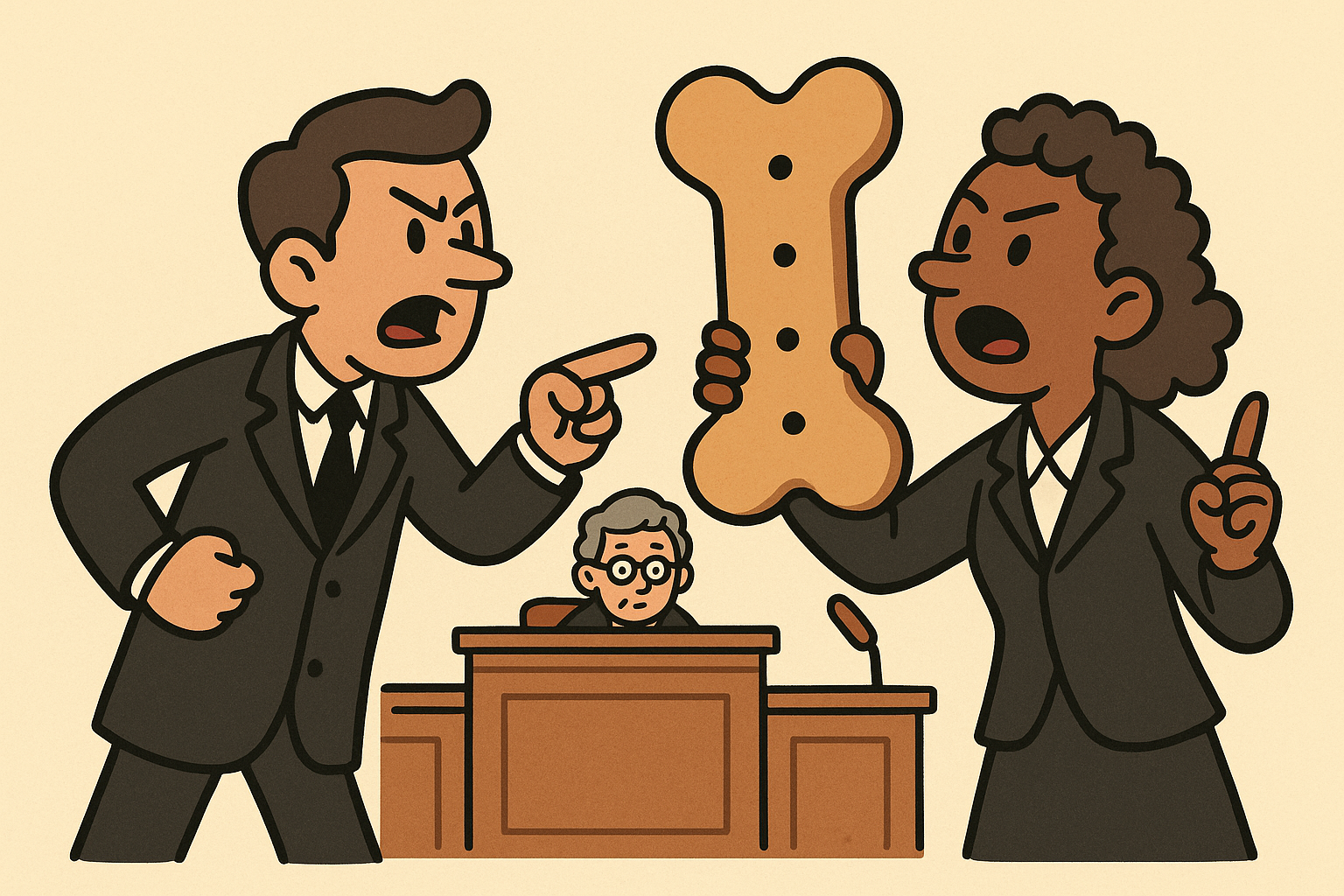
August 2025
What if the man who loves you, tucks you in, and taught you to ride a bike isn’t the man who shares your DNA? Who’s your real dad—your biological father, or the one who’s been there all along?
In Kansas, a quiet custody case just sent shockwaves through the foundations of American family law. The case, In re Parentage of R.R., didn’t make headlines like Dobbs or Obergefell. But for attorneys, judges, and families across the country, it might prove just as revolutionary.
At its heart, the case asked one question: Can a man lose legal parenthood even if he’s not the biological father? The answer, affirmed by the Kansas Supreme Court in 2023, was a loud and deliberate yes. But the court didn’t stop there. In R.R., Kansas reaffirmed a growing national consensus: genetics matter, but relationships matter more.
📜 The Case in 60 Seconds
Visual Case Brief: In re Parentage of R.R.
| Issue | Who should be declared the legal father of a child born during marriage: the biological father (T.T.) or the mother’s husband (T.R.)? |
|---|---|
| Facts | R.R. was born to a married couple, but the biological father (T.T.) had a DNA test showing 99.9% probability of paternity. Both men acted as “dad.” |
| Trial Court | Chose T.R., the husband, citing the best interests of the child—including sibling bonds and home stability. |
| Supreme Court Holding | Affirmed. When two men both have legal presumptions of paternity, courts must pick based on what’s best for the child—not biology alone. |
| Impact | Solidified Kansas’s “best interests of the child” standard in parentage disputes. Set precedent for weighing competing claims of fatherhood. |
Love, DNA, and the Law Collide
R.R. was born into a complicated world. His mother was married to T.R., who held him at birth, signed the birth certificate, and raised him like his own. But biology had a different script: a man named T.T.—a former partner of the mother—turned out to be the biological father.
When DNA confirmed his paternity, T.T. did what many would call the right thing. He stepped up. He asked the court to recognize him as R.R.’s legal father. By then, the mother had separated from her husband and moved in with T.T. Even the child called both men “Dada.”
What followed was a legal tug-of-war between two loving dads.
The New Fatherhood Math: 1 Child + 2 Dads = 1 Legal Parent?
For generations, U.S. family law followed a simple formula: paternity = biology or marriage, and once established, that was the end of the story.
But R.R. showed how outdated that equation has become. In a ruling rich with psychological insight and legal nuance, the Kansas courts weighed not just whose sperm started the journey, but who showed up along the way.
“Biology is not necessarily destiny under the Kansas Parentage Act.”
— Kansas Court of Appeals, quoting In re M.F.
In the final decision, the court awarded legal fatherhood to T.R.—the mother’s husband—even though he wasn’t R.R.’s biological parent. Why? Because he had been there since day one. Because R.R. had a brother (T.R.’s son), and the court feared that declaring different fathers would fracture that bond. Because, in the judge’s words, “continuity of care and sibling unity” trumped DNA.
📊 How Kansas Compares: Parentage Conflict Laws Across the U.S.
| State | Dominant Rule in Competing Paternity Presumptions | Allows Multi-Parent Legal Status? |
|---|---|---|
| Kansas | Best interest of the child decides between marital and biological presumption | ❌ No |
| California | Best interest + child may have >2 legal parents if denying would harm child | ✅ Yes |
| Pennsylvania | Paternity by estoppel favors established social parent over biological | ❌ No |
| New York | Equitable estoppel blocks paternity testing if not in child’s interest | ❌ No |
| Texas | DNA trumps marital presumption unless estoppel applies | ❌ No |
 What R.R. Teaches Family Lawyers (and the Rest of Us)
What R.R. Teaches Family Lawyers (and the Rest of Us)
For practitioners in family law, the lessons are practical and profound:
-
Act fast. Delay can entrench the other side’s claim. The first to build a bond may win, regardless of genetics.
-
Prove parenthood with actions, not ancestry. The quality of caregiving matters more than chromosomes.
-
Sibling relationships are key. Courts will go to great lengths to avoid tearing apart bonded children—even half-siblings.
-
DNA isn’t king. It’s a factor, but not the whole story.
And here’s the biggest takeaway: legal parenthood is no longer just about who you are, but who you’ve been in the child’s life.
A Glimpse at the Future: Three-Parent Families?
Though Kansas law only allows two legal parents per child, R.R. may fuel interest in a growing legal trend: multi-parent recognition. California already permits courts to designate more than two parents in limited cases. Could a future version of R.R. have ended with both men legally recognized? Maybe not today—but in five years? Don’t bet against it.
Final Thoughts
In re Parentage of R.R. won’t change your constitutional rights or rewire your taxes. But it might redefine your family. And in a world where modern families are built from biology, love, marriage, separation, surrogacy, and everything in between, that might be the most important shift of all.
In the end, R.R. got to keep his older brother, his bedtime routines, and his “Dada.” Just not the one whose DNA he shares.
And that may be exactly what justice looks like.
Endnotes
-
In re Parentage of R.R., 540 P.3d 1188 (Kan. 2023).
-
Kan. Stat. Ann. § 23-2208(c).
-
In re Marriage of Ross, 783 P.2d 331 (Kan. 1989).
-
Greer v. Greer, 324 P.3d 310 (Kan. Ct. App. 2014).
-
In re Parentage of M.F., 475 P.3d 642 (Kan. 2020).
-
Michael H. v. Gerald D., 491 U.S. 110 (1989).
-
California Family Code § 7612(c).
-
See also: Vedder & Miller, “Presumptions in Paternity Cases,” Family Advocate, Vol. 40, No. 4 (2018).
-
In re Parentage of A.S., No. 124,756 (Kan. Ct. App. 2023) (unpublished).
-
In re J.B. & N.B., No. 128,236 (Kan. Ct. App. 2025) (addressing constitutional challenge to best-interest standard).







